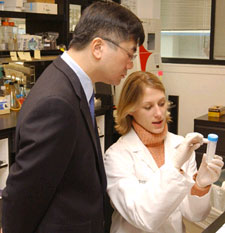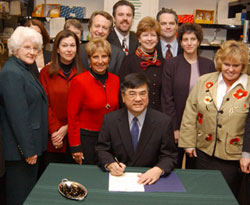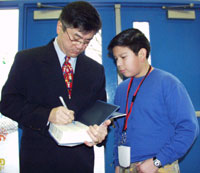
| » News room | » Working Capitol archives |
February 20, 2004
Message from the Governor America has always prospered through innovation, and Washington is an innovation state. We are home to some of the top technology companies in the world. These innovative companies are an important part of our state's economic future.
America has always prospered through innovation, and Washington is an innovation state. We are home to some of the top technology companies in the world. These innovative companies are an important part of our state's economic future. Our industries of the future include advanced computing, biotechnology, advanced materials, electronic device technology and environmental technology. These industries have spawned hundreds of companies across our state already-and created thousands of jobs. These industries of the future will continue to provide thousands of additional jobs in the future. But only if we continue to nurture and support them.
That's why yesterday I was pleased to sign into law a bill that extends high-tech research and development tax incentives. This legislation is part of the economic development package I've requested from the Legislature this session. The bill extends soon-to-expire tax incentives for research in specific technology areas, and for construction of research facilities. The new law also grants a sales tax deferral on research facilities built by our universities, and eliminates the B&O tax on federal research grants to small businesses.
 We know that these tax incentives work-and work well. A study by the state Department of Revenue shows that 76 percent of our state's high-tech companies have expanded their R&D investment since 1993, when the incentives were first enacted. We've seen that these tax incentives are critical in creating new ideas, new technologies, new products, new markets, and new jobs in our state.
We know that these tax incentives work-and work well. A study by the state Department of Revenue shows that 76 percent of our state's high-tech companies have expanded their R&D investment since 1993, when the incentives were first enacted. We've seen that these tax incentives are critical in creating new ideas, new technologies, new products, new markets, and new jobs in our state. This legislation will enable and encourage our state's high-tech companies to focus on innovation and hire more people to conduct critical research. It will help our state maintain its leadership as an innovation state, and continue to break new ground. We will be better able to compete with other states in such research-intensive fields as biotechnology.
| Quote of the Week “I am pleased that legislators-Democrats and Republicans-recognized the importance of extending tax incentives for critical research and development in our state. These incentives will enable Washington's high-tech companies to hire more people to generate the innovations that are the foundation of their success and a key part of our economic future.” -Governor Locke, February 19, 2004 |
As our state's high-tech industries continue to develop and expand, we must make sure that we're also providing the well-educated, well-trained workforce Washington businesses will need to support growth and remain competitive. This means that we must increase enrollment capacity at our colleges and universities. We need to make sure that Washington students will have the opportunity to land these good-paying jobs.
We've made great strides in economic development in recent years. By extending the R&D tax incentives, we are capitalizing on this momentum to create more jobs and build a brighter economic future.
Sincerely,
Gary Locke
Governor
News Highlights
Leadership on Transportation
| Governor's Priorities |
 The plan makes key investments to rebuild, expand and improve the safety of Washington highways. It also supports the replacement of 1927-era ferry vessels; provides grants for transit services-especially for the disabled and seniors; and strengthens the state's successful passenger rail program. The plan also added accountability measures and took scores of other steps to improve the state's transportation system.
The plan makes key investments to rebuild, expand and improve the safety of Washington highways. It also supports the replacement of 1927-era ferry vessels; provides grants for transit services-especially for the disabled and seniors; and strengthens the state's successful passenger rail program. The plan also added accountability measures and took scores of other steps to improve the state's transportation system. Job Creation in Spokane
Governor Locke praised the hard work of the Spokane Intercollegiate Research and Technology Institute (SIRTI) in securing a multi-million dollar federal grant to expand the facility and create hundreds more good-paying jobs in Eastern Washington. SIRTI announced that it will receive more than $3 million from the federal Economic Development Administration to build the new SIRTI Technology Center (STC). SIRTI estimates the STC will generate approximately 1,200 new jobs during the next decade. “This is great news for SIRTI, and great news for Washington state,” the Governor said. “This new facility will help fuel the 'innovation economy' in Spokane and the Inland Northwest, helping to turn great ideas into great new companies that create jobs and improve the health care of all of our citizens.”
Walla Walla Readers Rule
 Governor Locke and Terry Bergeson, state superintendent of public instruction, presented Blue Ridge Elementary School in Walla Walla with the “Reading School of the Month” award for February 2004 on February 13. “No matter what you want to do when you grow up, you have to start by being a good reader,” the Governor told the students. “Reading is the key to all academic success. I am so proud of all the progress Blue Ridge students have made in reading, in a relatively short period of time. You definitely deserve this honor.” Blue Ridge Elementary is above the state average percentages in reading and mathematics on the Washington Assessment of Student Learning. Two years ago, the school had scores significantly below state averages. Nearly 89 percent of Blue Ridge students participate in the state's free or reduced price lunch program.
Governor Locke and Terry Bergeson, state superintendent of public instruction, presented Blue Ridge Elementary School in Walla Walla with the “Reading School of the Month” award for February 2004 on February 13. “No matter what you want to do when you grow up, you have to start by being a good reader,” the Governor told the students. “Reading is the key to all academic success. I am so proud of all the progress Blue Ridge students have made in reading, in a relatively short period of time. You definitely deserve this honor.” Blue Ridge Elementary is above the state average percentages in reading and mathematics on the Washington Assessment of Student Learning. Two years ago, the school had scores significantly below state averages. Nearly 89 percent of Blue Ridge students participate in the state's free or reduced price lunch program. Success Story: Department of Revenue and Attorney General Get the Feds to Pay Up
The U.S. Department of Energy has agreed to pay the state of Washington a $6.8 million tax-related debt for work the federal government did at the Hanford Nuclear Reservation more than 10 years ago. The federal agency agreed to make the payment in lieu of business and occupation taxes after Attorney General Christine Gregoire sued the federal agency last month at the request of the Washington State Department of Revenue. The state had been seeking the payment since 1993, after Hanford was considered as a potential site for a nuclear waste repository. Under the Nuclear Waste Policy Act of 1982, the Department of Energy is required to pay the equivalent of state business and occupation taxes for activities such as surveying, sampling and testing that took place after Hanford was identified as a potential site in 1986. The Energy Department's own appeals board finally ruled in July 2003 that it had to pay the debt. However, the department still didn't pay, triggering the January lawsuit.
Upcoming Events
2/20-24: National Governors Association Meeting, Washington, D.C.
2/25: Weekly News Conference, Olympia
2/25: Competitiveness Council Meeting, Olympia
Legal Notice:
Nothing in this publication does, or is intended to, assist, promote or oppose any ballot proposition or campaign for elective office. The purpose of this publication is to improve the executive management of state government through enhanced communication of the administration's plans, objectives and accomplishments to state employees and members of the public who have requested this public information by subscribing.
Nothing in this publication does, or is intended to, assist, promote or oppose any ballot proposition or campaign for elective office. The purpose of this publication is to improve the executive management of state government through enhanced communication of the administration's plans, objectives and accomplishments to state employees and members of the public who have requested this public information by subscribing.
| » News room | » Working Capitol archives |
Home
Governor Locke
- About the Governor
- Cabinet
- Senior Staff
- Executive Orders
- Proclamations
- Boards and Commissions
- Contact the Governor
The First Lady
News Room
About Washington
- Washington State Facts
- Photo Gallery
- The 50 State QuartersTM Program
- State Legislature
- Washington Courts
- US Census 2000
- Register to Vote